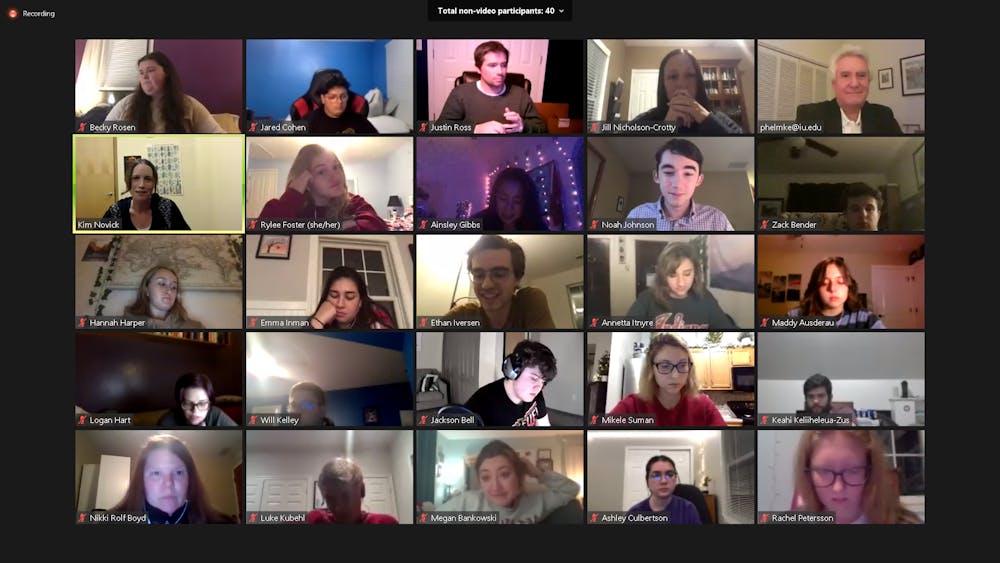Four IU professors and subject experts participated in a panel and discussed future policy implications of a Biden-Harris administration Wednesday night.
The panelists gave a brief overview of their focus area and how the Biden administration might affect it and answered audience questions. The panel is the first of two in a series hosted by the Paul H. O’Neill School of Public and Environmental Affairs.
Kim Novick, associate professor in SPEA and an environmental scientist, said Biden’s climate plan is aggressive and sets the right goals to meet the Paris Agreement.
“The mood among climate scientists right now is, I would say, cautiously optimistic,” she said.
Novick said the Biden administration will likely rejoin the Paris Agreement and put back in place executive orders for environmental protections which were overturned by the Trump administration.
The Biden administration has a goal of net zero emissions by 2050, but reaching this goal will require durable solutions such as legislative policy change, Novick said.
“I’m optimistic that these quote unquote easy things that Biden can do right away, including rejoining the Paris Accord, will generate some momentum,” she said. “I do not think they are enough to get to net zero by 2050.”
Justin Ross, associate professor in SPEA and public finance economist, said Biden will target high income households with his tax policy by rolling back tax treatments that benefit higher earners.
Biden will also increase taxes on corporations, invest in green energy and discourage fossil fuel usage by implementing higher taxes on the industry, Ross said. However, Ross said Biden is not proposing high middle class tax cuts like other countries have done.
Jill Nicholson-Crotty, associate professor in SPEA who focuses on public and nonprofit management, said she thinks the Biden administration will enforce police oversight and implement diversity and inclusion training for police departments.
“The Biden administration has signaled that there is a commitment to justice and social justice and social equity,” she said.
Paul Helmke, director of the Civic Leaders Center and professor of practice in SPEA, said the Biden administration will face challenges enforcing stricter gun control with a likely divided Congress, but it can be done by enforcing current laws and regulations.
IU student Jared Cohen asked the panel how the Biden administration and Department of Justice will combat violence in cities.
Nicholson-Crotty said the Biden administrations’ receptiveness for increasing gun control laws is a good sign. She said mental health, poverty and domestic violence play a role in gun violence in cities.
“We don’t have one solution to this,” she said. “We need to have, kind of, multiple avenues.”
Helmke said Biden’s support of the 1994 Crime Bill has been controversial and recognizes some aspects of the bill, such as mandatory minimum sentences, caused problems.
IU student Maya Wasserman asked how the Biden administration will deal with the lack of regulations on pollution and various environmental acts that were repealed by the Trump administration.
Novick said the Trump administration limited the number of wetlands and streams protected by the Clean Water Act and rolling back that rule would lead to difficult fights in a majority Republican Supreme Court.
However, Novick said the Biden administration appears committed to combating climate change and protecting water and air quality.
IU student Ellie Score asked how the Biden administration will impact the national budget.
Ross said the Biden administration will likely focus on balancing particular funds such as Medicare, Medicaid and Social Security rather than balancing the entire national budget at once.
IU student Mikele Suman asked how the Biden administration will reduce mass incarceration.
Nicholson-Crotty said the Biden administration will focus on ensuring previously incarcerated individuals have the opportunity to rejoin society. Another focus will be rehabilitation rather than incarceration for those with drug-related offenses, she said.
Helmke said the recent social justice protests with Black Lives Matter have made people more supportive of changing how states handle incarceration.
“There’ll be some resistance, certainly, but if we can’t make this step, we certainly have problems,” he said.
The panel concluded with the experts giving their opinions on whether the polarized political climate will see an improvement under the Biden presidency. The panelists agreed Biden is able to bring people together and successfully work across party lines.
“If anyone can do it, it would be Joe Biden,” Helmke said.




